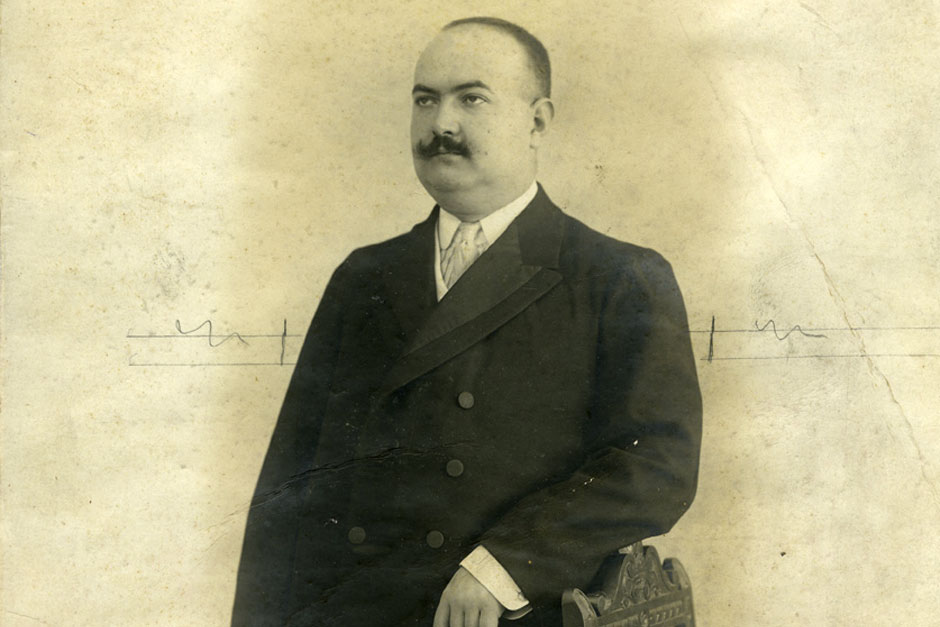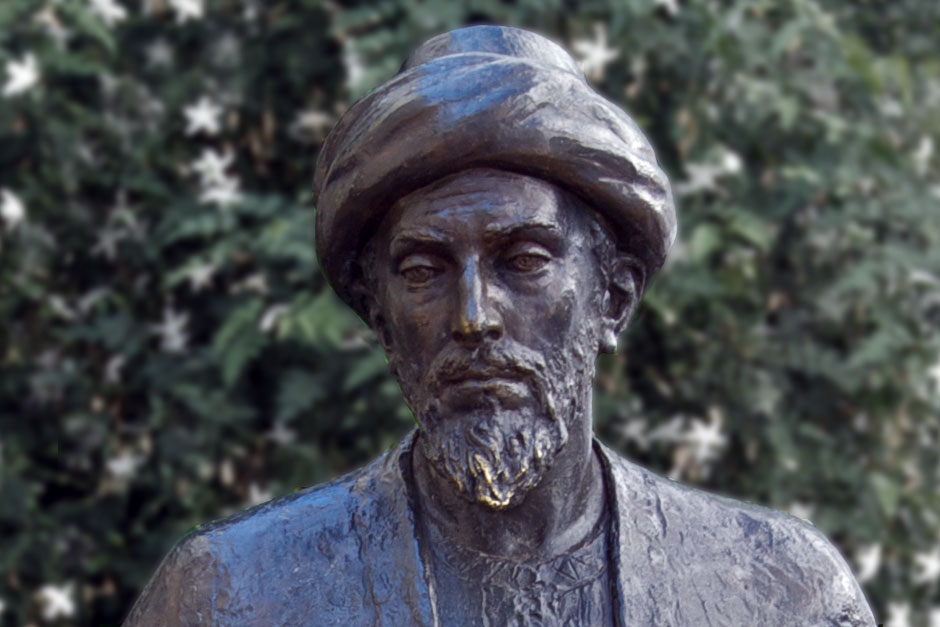Biography
En árabe Abū l-Ḥasan b. al-Levī. Se ha dicho que todo en la vida de este hombre extraordinario fue grande, luminoso, elevado y puro. Su vida se encuentra rodeada de brumas que impiden establecer con claridad su biografía, aunque se reconoce que fue una de las grandes personalidades judías de finales del siglo XI y la primera mitad del siglo XII.
Durante mucho tiempo se pensó que había nacido en Toledo, noticia tomada de un pasaje del Libro de la Poética de Mošeh ben ‘Ezra’, texto escrito en árabe, donde se afirma que Yěhudah ha-Levi y Abraham ben ‘Ezra’ eran toledanos. El error proviene de la semejanza de los nombres árabes de Toledo y Tudela. Sin embargo, investigaciones especializadas han mostrado que Ha-Levi había nacido en Tudela, como lo confirma, además, el propio Abraham ben ‘Ezra al decir de sí mismo que era de Tudela (Tutīla). Era una ciudad que pertenecía al reino de los Banū Hūd de Zaragoza, en la que existía una floreciente comunidad judía. [...]
Works
Dīwān
Kitāb al-űuųųa wa-l-dalīl fī nuşr aldīn al-dalīl (Libro de la prueba y del fundamento en defensa de la religión menospreciada), entre 1130-1140 (eds. y trads.: Cuzary. Libro de grande ciencia y mucha doctrina, traduzcido del ebrayco en español y comentado por el Hacham R. Jacob Abendana, Ámsterdam, 1663
Das Buch Al-Chazari, ed. H. Hirschfel, Leipzig, I, 1886
II, 1887
Diálogo filosófico, a cargo de A. Bonilla y San Martín, con apéndice de M. Menéndez Pelayo, Madrid, 1910).
Bibliography
Liber Cosri, continens colloquium seu disputationem de religione [...], transtulit de lingua Arabica R. Jehudah Aben Tybbon. Nunc recensuit, Latina versione &
notis illustravit Johannis Buxtorpius, Basileae, 1660
D. Kaufmann, Jehuda Halevi. Versuch einer Charakteristik, Breslau, 1877
H. Brody (ed.), Diwan. Yehudá Halevi, Berlín, 1894-1930, 4 vols.
F. J. Goldziher, “Le Amr Ilahi (ha-inyan ha-elohi) chez Judah Halévi”, en Revue des Études Juives, 50 (1905), págs. 32-41
D. Neumark, Jehuda Halevi’s Philosophy in Its Principles, 1908
A. Bonilla y San Martín, Historia de la filosofía española (siglos VIII-XII: Judíos), Madrid, Librería General de Victoriano Suárez, 1911, págs. 229-258
H. A. Wolfson, “Maimonides and Hallevi: A Study in Typical Jewish Attitudes toward Greek Philosophy in the Middle Ages”, en The Jewish Quarterly Review, 2 (1912), págs. 297-337
E. Berger, Das Problem der Erkenntnis in der Religionsphilosophie Jehuda Hallevis, 1916
D. H. Baneth, Jehuda Hallevi und Gazali, Berlin, 1924
M. König, Die Philosophie des Jehuda Halevi und des Abraham ibn Daud, 1929
M. Ventura, Le Kalam et le Péripatétisme d’après le Kuzari, Paris, J. Vrin, 1934
H. A. Wolfson, “Halevi and Maimonides on Design Chance and Necessity”, en Proceedings of the American Academy for Jewish Research, 11 (1941), págs. 105-163
“The Platonic, Aristotelian and Stoic Theories of Creation in Halevi and Maimonides”, en Essays in Honor of the very Rev. Dr. J. H. Hertz, London, 1942, págs. 427-442
L. Strauss, “The Law of Reason in the Kuzari”, en Proceedings of the American Academy for Jewish Research, 13 (1943), págs. 47-96
J. M. Millás Vallicrosa, Yěhudá ha-Leví como poeta y apologista, 1947
G. Vajda, Introduction à la pensée juive du Moyen Âge, Paris, J. Vrin, 1947
J. M. Millás Vallicrosa, La poesía hebraicoespañola, Madrid, Consejo Superior de Investigaciones Científicas, 1948
M. Wienner, “Judah Halevi’s Concept of Religion and a Modern Counterpart”, en Hebrew Union College Annual, 23 (1951), págs. 669-682
S. Pines, “Note sur la doctrine de la prophétie et la rehabilitation de la matière dans le Kuzari”, en Mélanges de philosophie et de littérature juïves, Paris, Presses Universitaires de France, 1957, págs. 253-260
H. A. Wolfson, “Judah Halevi on Causality and Miracles”, en Meyer Waxman Jubilee Volume, Chicago-Jerusalén, 1966, págs. 137-153
J. Millás Vallicrosa, Literatura hebraicoespañola, Barcelona, Labor, 1968
H. Davidson, “The Active Intellect in the Cuzari and Hallevi’s Theory of Causality”, en Revue des Études Juives, 131 (1972), págs. 351-395
Y. Silman, “Historical Reality in the Kusari”, en Daat, 2-3 (1978-1979), págs. 29-42
Yehudah Halevi, Cuzary, ed. de J. Imirizaldu, Madrid, Editora Nacional, 1979
A. L. Motzkin, “On Halevi’s Kuzari as a Platonic Dialogue”, en Interpretation, 9 (1980), págs. 111-124
Y. Silman, “Between Theory of God and Theory of Man in the Kuzari”, en Daat, 4 (1980), págs. 7-34
R. Jospe, “Jewish Particularity from Ha-Levi to Kaplan: Implications for Defining Jewish Philosophy”, en Forum, 46-47 (1982), págs. 77-90
A. Ivry, “The Philosophical and Religious Arguments in Rabbi Yehuda Halevy’s Thought”, en VV. AA., Thought and action. Essays in memory of Simon Rawidowicz, Haifa, 1983, págs. 23-33
R. Castillo, Yehuda ha-Levi. Antología poética, Madrid, Altalena, 1983
C. Sirat, La Philosophie juive au Moyen Âge, Paris, CNRS, 1983
Y. Silman, Thinker and Seer. The Development of the Thought of Yehuda Halevi in the Kuzary, Ramat Gan, 1985
J. Gil Albert y J. Kahn
Yehudah ha-Levi, Madrid, Júcar, 1986
H. Kreisel, “Judah Halevi’s Influence on Maimonides: A Preliminary Appraisal”, en Maimonidean Studies, 2 (1991), págs. 95-122
A. Sáenz-Badillos y J. Targarona Borrás, Diccionario de autores judíos (Sefarad. Siglos X-XV), Córdoba, El Almendro, 1992
Y. Silman, Philosopher and Prophet: Judah Halevi, the Kuzari, and the evolution of his thought, Albany, State University of New York Press, 1995
M. Orfali, Biblioteca de autores lógicos hispano judíos (siglos XI-XV), Granada, Universidad, 1997
S. Pines, “Shi‘ite Terms and Conceptions in Judah Halevi’s Kuzari”, en VV. AA., The Collected Works of Sholomo Pines, vol. V, Jerusalén, The Magnes Press, 1997, págs. 219-305
R. Ramón Guerrero, Filosofías árabe y judía, Madrid, Editorial Síntesis, 2001
J. Lomba Fuentes, El Ebro: Puente de Europa. Pensamiento musulmán y judío, Zaragoza, Mira Editores, 2002.
Relation with other characters
Events and locations




